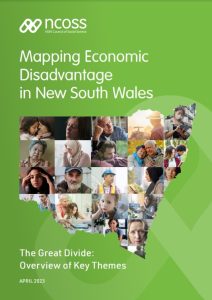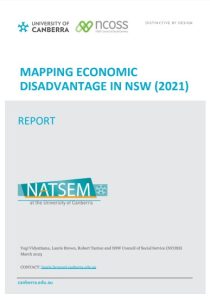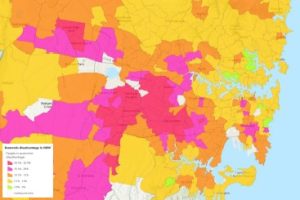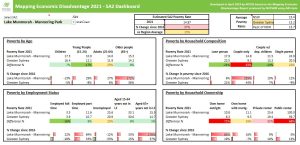Mapping Economic Disadvantage in NSW Report – 2023
The 'Mapping Economic Disadvantage in NSW' project was released in April 2023.
The research breaks down poverty rates and gives us a sophisticated picture of where people living with disadvantage are located and who they are – including their age, sex, employment, family arrangements, and housing tenure. It shows us that the characteristics of people living with disadvantage can vary strikingly from one community to another. Vitally, it also shows us how the picture of significant economic disadvantage has changed since 2016.
There are two reports for this research:
- Key Themes Report - provides an overview of the key themes, highlighting how poverty in NSW is changing and the groups most impacted. It draws on the detailed data to highlight emerging patterns, and the policy solutions that will make a difference.

- Research Report - details the results of the data modelling undertaken by NATSEM, providing an in-depth break-down of poverty rates by demographic cohorts and geography and highlighting differences between 2016 and 2021 modelling results.

Complementing these are two tools to help non-government organisations, elected officials, government departments and agencies at all levels, to access, explore and use the small-scale geographic data on poverty rates.
- Online Mapping Tool: It allows users to filter the data for different population groups, by different variables, and to see the results for small geographic areas - equivalent to suburbs and towns – across NSW.

- Data Dashboard (updated August 2023). It allows users to drill-down to individual small geographic areas to see poverty rates for different variables, how they compare to NSW averages, and how they have changed since 2016.

NCOSS encourages all those interested in poverty to use these tools to better understand the extent and concentration of economic disadvantage in our State.
This research was undertaken by the National Centre for Social and Economic Modelling (NATSEM) in the Faculty of Business, Government and Law at the University of Canberra, and was commissioned by the New South Wales Council of Social Service (NCOSS).
